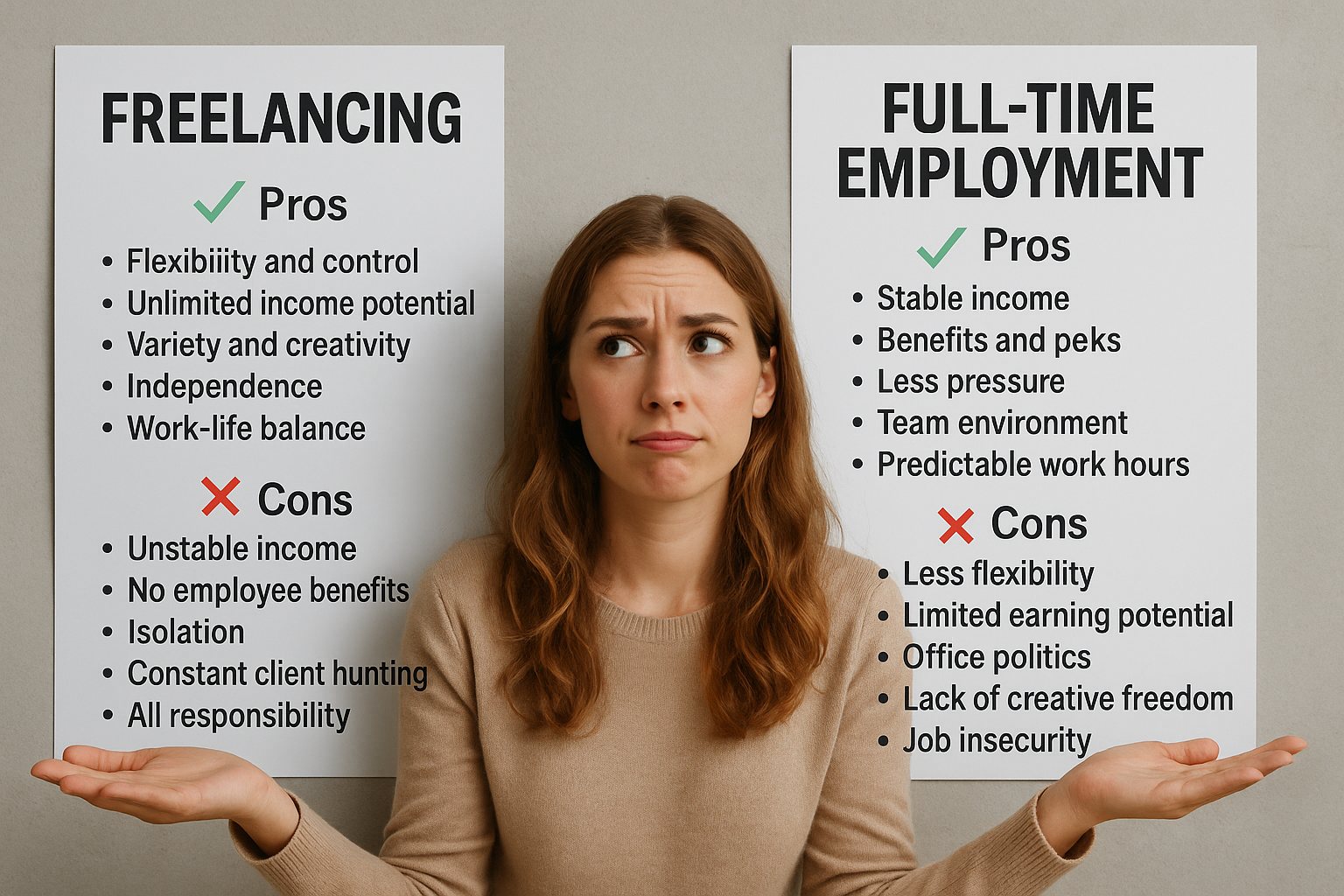In today’s work landscape, more professionals are asking: should I stay in a traditional job or go freelance? Both paths offer unique advantages—and challenges. Whether you’re considering freelancing for more freedom or wondering if a steady paycheck is worth the trade-offs, this article will help you compare freelancing vs. full-time employment so you can decide which path fits your lifestyle, goals, and values.
What Is Freelancing?
Freelancing means working independently, offering your services to clients (businesses or individuals) on a project or contract basis. You are your own boss, set your own rates, and choose the clients you work with.
Popular freelance roles include:
- Writers
- Designers
- Developers
- Social media managers
- Virtual assistants
- Marketers
Freelancers may work with one client at a time or juggle several projects.
What Is Full-Time Employment?
Full-time employment usually involves:
- A fixed monthly salary
- Set working hours (e.g., 9–5)
- Working for one employer
- Company-provided benefits like insurance and paid leave
- Legal protections and structure
You’re part of a company’s team and are expected to follow policies and contribute to long-term goals.
Freelancing: Pros and Cons
✅ Pros of Freelancing
1. Flexibility and Control
Work where and when you want. Take breaks, travel, or choose your own schedule.
2. Unlimited Income Potential
No salary cap—you set your rates and scale your business.
3. Variety and Creativity
Work on different projects with various clients. Avoid monotony.
4. Independence
Be your own boss. Make decisions without approval from managers.
5. Work-Life Balance (if managed well)
Create a lifestyle that supports your personal priorities.
❌ Cons of Freelancing
1. Unstable Income
Some months are better than others. You must manage cash flow carefully.
2. No Employee Benefits
You handle your own health insurance, taxes, and retirement savings.
3. Isolation
Working alone can feel lonely—especially without a team.
4. Constant Client Hunting
You need to consistently market yourself and find new work.
5. All Responsibility Falls on You
You manage everything—from invoicing to contracts to communication.
Full-Time Employment: Pros and Cons
✅ Pros of Full-Time Work
1. Stable Income
A regular paycheck provides financial consistency.
2. Benefits and Perks
Health insurance, paid time off, sick leave, and bonuses are often included.
3. Less Pressure
You’re not responsible for finding clients or managing the business.
4. Team Environment
You get support, mentorship, and social interaction.
5. Predictable Work Hours
You usually have a structured schedule with clear expectations.
❌ Cons of Full-Time Work
1. Less Flexibility
You may need permission for time off or breaks.
2. Limited Earning Potential
Raises and promotions are often slow and depend on company structure.
3. Office Politics and Hierarchies
You may deal with bureaucracy, unfair management, or toxic culture.
4. Lack of Creative Freedom
Projects are often controlled by managers or clients you can’t choose.
5. Job Insecurity
Layoffs, restructuring, or economic shifts can affect your position.
Freelancing vs. Full-Time: Key Comparisons
| Factor | Freelancing | Full-Time Employment |
|---|---|---|
| Income Stability | Variable | Consistent |
| Benefits | Self-managed | Employer-provided |
| Flexibility | High | Low to moderate |
| Workload Control | Choose your projects | Work is assigned |
| Career Growth | You define it | Structured promotions |
| Risk Level | Higher | Lower |
| Independence | High (you’re the boss) | Low (you follow company rules) |
Who Should Consider Freelancing?
Freelancing may be right for you if:
- You value autonomy and flexibility
- You’re self-motivated and organized
- You’re comfortable with financial risk
- You want to choose your clients and projects
- You’re ready to build your personal brand or business
Who Should Stick With Full-Time Employment?
Full-time work may be better if:
- You prefer stability and structure
- You enjoy teamwork and collaboration
- You value benefits like insurance or paid leave
- You’re not interested in business management
- You’re early in your career and want to learn from others
Can You Combine Both?
Yes! Many people start freelancing on the side while working full-time. This gives you the chance to:
- Test the waters
- Build a portfolio
- Earn extra income
- Transition slowly into full-time freelancing if desired
Just check your employment contract for restrictions on side gigs.
Final Thoughts: Choose What Aligns With You
There’s no one-size-fits-all answer. Both freelancing and full-time jobs offer value—it depends on your goals, lifestyle, and personality.
Ask yourself:
- Do I thrive with structure or freedom?
- Am I ready to manage my own income and clients?
- What kind of life do I want in the next 3–5 years?
Whatever you choose, remember: it’s not permanent. You can always shift, combine, or evolve.

